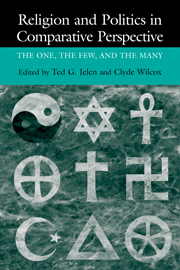Book contents
- Frontmatter
- Contents
- List of Contributors
- Preface
- 1 Religion: The One, the Few, and the Many
- 2 The Challenge of Pluralism
- 3 Catholicism, Politics, and Culture in the Republic of Ireland
- 4 Religion and Politics in Iberia
- 5 The Religious Dimension of Israeli Political Life
- 6 Between Heaven and Earth
- 7 Islamism in Contemporary Arab Politics
- 8 Religion and Politics in a Secular Europe
- 9 Religion and Democracy in South America
- 10 Looking for Hope in Central America
- 11 Religion and Politics in India
- 12 Religion and Politics in Japan
- 13 Religion and Politics in an Open Market
- 14 The Political Roles of Religion
- Index
14 - The Political Roles of Religion
Published online by Cambridge University Press: 05 June 2012
- Frontmatter
- Contents
- List of Contributors
- Preface
- 1 Religion: The One, the Few, and the Many
- 2 The Challenge of Pluralism
- 3 Catholicism, Politics, and Culture in the Republic of Ireland
- 4 Religion and Politics in Iberia
- 5 The Religious Dimension of Israeli Political Life
- 6 Between Heaven and Earth
- 7 Islamism in Contemporary Arab Politics
- 8 Religion and Politics in a Secular Europe
- 9 Religion and Democracy in South America
- 10 Looking for Hope in Central America
- 11 Religion and Politics in India
- 12 Religion and Politics in Japan
- 13 Religion and Politics in an Open Market
- 14 The Political Roles of Religion
- Index
Summary
The chapters in this book have shown that religion can play a variety of roles in national and international politics. Clearly these roles are shaped by history, by culture, and by external forces in each country, by political institutions and the shape of civil society. Yet we also believe that these cases allow us to begin to formulate some cross-national generalizations about the political importance of religion. We are still far from any single unified theory of religion and politics, but some useful, midlevel, cross-national generalizations have emerged from the work of the contributors to this collection. Although some of the expectations raised in the introduction have been supported by the case studies, more often our attempts at more general understandings of the political roles of religion have been modified by encounters with empirical data.
The essays in this collection are intended to describe and explain the “style” of religious politics in a variety of national and regional settings. To some extent, the nature and extent of religious conflict and/or consensus constitutes the broadly defined “dependent variable” in this inquiry. At the outset of this volume, we suggested that the nature of religious politics in a given setting is likely to be a function of two general independent variables: the structure of the religious “market” in a particular nation, and the content of the religious creed or creeds in question. Based on the case studies in this collection, we offer some tentative generalizations about these relationships.
- Type
- Chapter
- Information
- Religion and Politics in Comparative PerspectiveThe One, The Few, and The Many, pp. 314 - 324Publisher: Cambridge University PressPrint publication year: 2002
- 7
- Cited by

